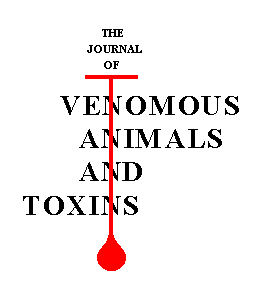THESIS: M. R. Oliveira submitted this dissertation for the degree of Master of Science publicly examined at the Department of Biology of the Institute of Biosciences of Rio Claro, São Paulo State University - UNESP- Rio Claro, Brazil in 1994.
Advisor: Professor Mário Sérgio Palma.
ABSTRACT. The venom reservoir of each Polybia paulista worker presents about 20 µg of crude venom, from which 15µg are composed of proteins and peptides. About 30% of proteic-peptidic material correspond to high molecular weight proteins, while the remaining 70% correspond to peptides. The proteic fraction of this venom contains two endogenous proteases (MW 60.000 and 46.000 Daltons), one acid (MW>100.000 Daltons) and one alkaline (MW 62.000 Daltons) phosphomonoesterases, one hyaluronidase (MW 119.000 Daltons), four phospholipases A2 (MW 124.000 Daltons) and two hemolysins (MW 95.000 and 28.000 Daltons) apparently not associated with the enzymes. At first P. paulista venom seems to contain no "lethal protein" as described in venoms of wasps from the sub-family Vespinae. Two biologically active amines were detected in this venom: serotonine (19 nmoles/venom reservoir) and histamine (0.74 nmoles/venom reservoir). Phospholipase A2 was purified by the combination of two chromatographic steps: molecular exclusion in Sephadex G-100 and ionic exchange in DEAE-cellulose under pH gradient from 4.5 to 6.0. Four different forms of phospholipase A2, with MW 124.000 Daltons, composed of subunits of MW 70.000 and 54.000 were purified. Each form was eluted at different pH value between 4.7 and 6.0, suggesting the existence of a different net charge of each form. These phospholipase A2 forms presented high contents of total sugars which changed from 12% to 43% (W/W). Three of these forms presented optimum pH between 7.8 and 8.0, while the fourth form did not present an optimum pH. When the steady state kinetic of phosphatidylcholine hydrolysis at pH 7.9 was studied, all forms revealed a negative cooperative behavior, where the affinity by the substrate changed about 10.000 times from the most active to the less active form. Hydrolysis of phosphatidylcholine as function of the time course of reaction showed an exponential increase of velocities during the initial seconds in all phospholipase forms. These velocities were activated by bovine serum albumin (BSA) in three forms, but inhibited the fourth form. In addition to this, all forms also presented indirect hemolytic activity which was strongly activated by BSA. Hyaluronidase was purified by using one step chromatography in CM-cellulose at pH 4.5. The purified enzyme presented two subunits (MW 64.000 and 55.000 Daltons) was unstable and little active. However, it was stabilized and activated by the association with two others proteins with MW 13.000 and 36.000 Daltons. The enzyme presented a total sugar content of 7% (W/W), while the activating proteins presented 12% (W/W) (MW 13.000 Daltons) and 62% (W/W) (MW 36.000 Daltons). The optimum pH for this enzyme was 5.0. The steady state kinetic of hydrolysis of chondroitin sulfate A at pH 5.2 showed a positive cooperative behavior, with Hill coefficient equal to 1.50, Vmax = 400 µmoles/ml.h and S0.5 = 1.8x10-3 M. The peptides from this venom were fractionated by high performance liquid chromatography, under reversed phase. Four different mastoparans were identified in this chromatographic profile, which induced serotonine delivery from platelets suspensions. Three of these components also presented direct hemolytic activity, while the fourth component presented only the secretogogue activity.
 CORRESPONDENCE TO:
CORRESPONDENCE TO:
M.R. OLIVEIRA - Departamento de Biologia do Instituto de Biociências - UNESP - CEP 13.500-000 - Rio Claro - São Paulo - Brasil.
Publication Dates
-
Publication in this collection
11 Jan 1999 -
Date of issue
1995

